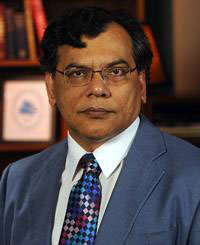 Keshav K. Singh, Ph.D., joined the UAB Comprehensive Cancer Center as senior scientist in the Cancer Cell Biology Program, director of the Cancer Genetics Program, and as the Joy and Bill Harbert Endowed Chair in Cancer Genetics.
Keshav K. Singh, Ph.D., joined the UAB Comprehensive Cancer Center as senior scientist in the Cancer Cell Biology Program, director of the Cancer Genetics Program, and as the Joy and Bill Harbert Endowed Chair in Cancer Genetics.
A leader in the field of cancer genetics, mitochondrial genetics and “intergenomic” cross talk between mitochondria and the nucleus, Dr. Singh is also professor in the Departments of Genetics, Pathology and Environmental Health.
“We are thrilled to have a researcher of Dr. Singh’s caliber join us at the Cancer Center,” says Edward Partridge, M.D., director of the Cancer Center. “His background and expertise will be instrumental in expanding our efforts in the growing and exciting field of cancer genetics.”
Dr. Singh obtained his undergraduate degree from Rohilkhand University, and a master's degree from G.B. Pant University of Agriculture and Technology, both in Uttar Pradesh, India. He earned his Ph.D. from the University of Wollongong in New South Wales, Australia. He was trained as a post-doctoral fellow at Harvard University and served as an assistant professor of oncology at the Sidney Kimmel Comprehensive Cancer Center at Johns Hopkins School of Medicine. Most recently he was at the Roswell Park Cancer Institute where he was a distinguished professor of oncology.
“Dr. Singh is internationally recognized for his research on cancer genetics and the genetics of energy metabolism. His arrival on campus will bring our research program on the genetics and genomics of cancer to a new level,” says Bruce Korf, M.D., Ph.D., chairman of the Department of Genetics and the director of the Heflin Center for Genomic Sciences.
In addition to his research in cancer genetics, Dr. Singh is passionate about promoting research and awareness around the world on mysterious mitochondrial diseases arising due to defect in the “power house of the cell.” “Since mitochondrial diseases are multisystem disorders, it is extremely difficult to diagnose. Unfortunately clinical standard for diagnosis and therapy for these diseases do not exist,” says Dr. Singh.
Dr. Singh is the founder of the Mitochondria Research and Medicine Society in the U.S. and the founding editor-in-chief of the journal, Mitochondrion. He also founded the Mitochondria Research and Medicine Society in India.
Dr. Singh’s basic research is focused on underlying mechanisms of mitochondria-to-nucleus retrograde signaling, “intergenomic” cross talk, genomic instability, and its role in cancer and other human diseases. Dr. Singh’s translational research include developing agents and methods that can detect and reverse mitochondrial defects in cells and identify potential "mitomutagens," which may contribute to development of human pathologies.
He is serving on the editorial board of several research journals, and is either serving or has served as an expert reviewer of grants submitted to numerous agencies such as National Institute of Health, National Research Council, U.S. Department of State, and the Canada- Komen Breast Cancer Foundation. He is the author of more than 75 research publications and three books, “Mitochondrial DNA Mutations in Aging, Disease and Cancer,” “Oxidative Stress, Disease and Cancer,” and “Mitochondria and Cancer.”
The UAB Comprehensive Cancer Center is among the 40 cancer centers in the nation to meet the stringent criteria for the National Cancer Institute's comprehensive designation. The center is a leader in groundbreaking research, reducing cancer disparities and leading-edge patient care.